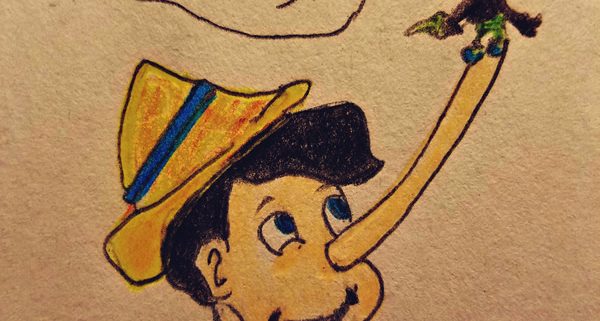How Detectives Know When a Suspect is Lying – Part 2
Kinesics is the study of nonverbal communication – body language. A suspect’s movements and gestures can tell investigators when he is being less than truthful. Some of these gestures are very slight while others are as plain as the nose on the suspect’s face.
Liars:
– Like to take up as little space as possible. To do so, they limit their arm and hand movements. They feel safer keeping their hands and arms close to their body.
– Movements are stiff and unnatural.
– Don’t like to make eye contact.
– Repeatedly touch their face, ears, and throat.
– Don’t like to touch their heart or chest area with an open hand.
– Repeatedly touch their nose or ears.
– Timing of gestures are delayed.

– Liars often use gestures that don’t match their verbal responses to a question (frown when they should smile).
– Guilty people are most often defensive.
– A guilty person likes to place an object (a pencil, paper, etc.) between himself and the officer as a protective barrier.
– Liars like to use the officer’s words to answer the question. (repeat the question before responding).
– Liars use contractions (I didn’t do it). Innocent people do not.
– Liars are not comfortable with silence. They ramble, and detectives should allow them to do so.
– Liars mumble and speak in monotone.
– Guilty people love it when detectives change the subject. They immediately become happy. Their sullen moods return when the detective returns to the subject at hand. Investigators intentionally switch topics as a ploy during interrogations.
– Liars and guilty people often use humor in their responses.








prowan – No, this is just a tool to help point investigators in the right direction. They must still gather hard evidence.
By the way, it’s good to see you here, too.
Lee,
Even if detectives have a sixth sense if someone cofesses to something and the detective can tell that person is lying (i.e a father confesses to a crime his son has committed) is there anything you can do about it since a “sixth sense” can not hold up in a court of law?
This is excellent info. I plan to use it when questioning my wild child son. LOL
Your response reminds me of an illustration in the International Spy Museum Handbook of Practical Spying — I’ve sent it to you in case you want to add it to your collection.
My question arose because the ‘baseline’ was established using exactly the same questions that he asked several times, and they were the same as the ones for the ‘real’ test.
I’m sure they don’t do that with suspects, but it did make me think the system must be quite accurate and/or reliable (albeit not perfect, I know) if they can still get good responses when the subject has already heard and answered the questions, both on and off the machine, several times.
Kim – Yes, it is, but good detectives do have that 6th sense.
Good points, Lee.
For the verbal responses, is it more difficult to get a sense of lying if you’re speaking with a person by phone?
Wendy – Thanks, but are you telling the truth. Hmmm…
Elena – Youre exactly right, and your concerns are taken into account by investigators. That’s why I mentioned in an earlier post that interrogators do not rely on a person’s single response to a question – they use a combination.
In fact, using body language to point to a murderer or any other criminal suspect is merely a tool, not an exact science. It’s not something that’s used in court when testifying, either. These responses are simply something detectives use to help point them in the right direction.
The last thing a detective, or any other officer, wants to do is zero in on the wrong person. Not only is that unfair, it’s a huge waste of time. Believe me, this is not something that’s used haphazardly.
Terry – Voice Stress Analysis is quite accurate, but is still a bit controversial. I know one particular polygraph examiner who says VSA is superior to the standard polygraph tests.
The questions you were asked in the beginning were to establish a baseline reaction. This baseline showed your truthful responses. Any deviance from those base patterns in later questions would have pointed toward your lack of truthfullness. In other words, your examiner would have immediately jumped up yelling, “Liar, liar, pants on fire.”
Fascinating post!
The one thing that seriously concerns me about these cause and effects is that they do not take into account cultural differences which can be quite opposite from what is written.
For example, I come from a culture where repeating the question is the polite way. I know other cultures where looking directly at someone is considered rude. And, touching of self or others mores vary wildly.
Responses also vary according to socio/economic environments.
Still it is a fascinating topic, and I always am tickled when I find an author who is willing to go out on this limb.
Glad to see you’re non-partisan there, Lee!
I’m one of those people who LOVE rewrites. For me, the first draft is sheer torture. It’s much more gratifying to see the crap I’ve written get “prettied” up. I get to add all those layers and nuances that never appear in the draft stage because I don’t know all the characters well enough.
When I had my VSA, the examiner said I was probably incapable of lying — we were talking about the fact that one of my responses gave an “iffy” reading, yet it was something that was definitely an honest answer, so we talked about possible reasons. He didn’t tell me if he was watching my eyes, though. I’ll bet he was.
The thing that impressed me about the test was that there was so much preparation – we went over all the questions several times before he ever clipped on the mic.
How does the VSA compare with the old polygraph tests? How does prepping the ‘suspect’ help interpret the results. My gut instinct says all that ‘practice’ would give someone who was lying the opportunity to be more convincing.
Or is it the anticipation of the question, so if you’re trying to hide something, your response will register differently even though you’ve ‘planned’ your answer?
And I imagine there’s a different line of questioning for a suspect! The biggies for vounteers were drug use, haveing commited a crime or been a suspect, and stealing things over $50 from employers. The rest were thing like, “are the walls blue?” and “are the lights on?”, and “is there a recorder on the table?”
Rewrites: depends on if they’re edits or major revisions. Edits can be boring, but they’re easy. Having to go pick up a loose thread and expand it means going back through the ENTIRE book to make sure everything is caught. And when that thread changes the entire emotional state of a character, then all the motivations and conflicts are screwed up. That means rewriting the next parts, and the next, until (you hope), you catch up to a place where things are good again.
It’s not such a big deal to have to drop in or remove a few clues, but keeping the continutiy for both plot and characters is tough.
wbereswill – It’s not just one or two of these traits that indicates a liar. It’s the combination of a few or the repeated use of one at the wrong time that sets off the detective’s alarm.
Terry – I agree. Rewrites are a pain. But, I have heard many writers say they love doing the second, third, and fourth passes. Not me.
Thanks, Lee. Great stuff. I’ve been an environmental auditor for quite some time and I’ve learned to look for a few of these signs.
As always, perfect information for a scene I’m working on. Which is why I’m so far behind in everything. I think rewrites are harder than getting it on the page the first time.